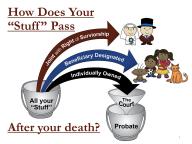|
Wednesday, June 8, 2022
Most parents are conflicted when their children reach their 18th birthday. For many families, that means their child will soon be leaving home for college, a new job, or the military. For parents of children with developmental disabilities, it can be very scary when that child turns 18, because the law presumes an 18-year-old is an adult with the legal rights and responsibilities that come with adulthood. When a child turns18, the parent no longer has the legal authority to make decisions for that child. Joshua, a good-looking young man with a developmental disability, turned 18 six months ago. Read more . . .
Wednesday, June 8, 2022
Phew! I’ve reached that point in life where I can relax – not much, but a little- because both of my children are adults and, for the most part, out of the nest. Until just a couple of years ago, I broke out in a sweat every time I had to go out of town on business by myself. Not only did I worry about whether my kids would get fed, get their homework done and make it to soccer practice on time, but I also worried about what would happen to them if I had an accident and didn’t make it home. If you have minor children, children under the age of 18, I’m sure you worry about that, too. If you are not around, who will feed them, help them with their homework and get them to soccer practice? Choosing someone to care for your children is difficult. Read more . . .
Monday, June 6, 2022
Writing Instructions to Potential Guardians If you have minor children, or children with disabilities, the thought of leaving them suddenly is unimaginable. Parents know their children- their schedules, their health, their likes and dislikes- but keep most of that knowledge in their heads. When my kids were growing up, I knew when they needed to be at soccer practice and church, who their doctor was and how to reach her, and how to tell when they were sick. Other than abbreviations on my calendar and names in my database, there was no formal written schedule of activities or list of important contacts. Most parents can’t imagine how someone would be able to step in and take care of their children. Read more . . .
Friday, April 8, 2022
 Last month, we introduced our year-long project to organize our estates. How did you do? Did you check all the boxes? As with most projects, sometimes getting started is the real goal, so give yourself a gold checkmark if you did anything to start getting your estate in order. This month, it is time to make sure we have legal documents in place to protect in case we become unable to make or communicate significant decisions about our healthcare or our finances. Years ago, I had a potential client whose daughter called my office several times to make appointments for him to get his estate planning documents prepared. As each appointment time approached, he called my office to cancel.
Read more . . .
Thursday, March 31, 2022
Adults, those persons who are over the age of 18, are presumed to have the legal right to make their own healthcare and safety decisions. However, in the event that an adult cannot make or communicate healthcare decisions, there should be legal documents in place to allow someone to be a healthcare surrogate decision maker. In Georgia, an adult who is able to understand what s/he is signing, can nominate an agent to make healthcare decisions for her/him for the time when s/he is not able to make such decisions. The primary document for nominating that person is called an advance directive for healthcare. What is An Advance Directive for Healthcare? An Advance Directive for Healthcare is a document in which you nominate an Agent to make healthcare decisions for you if you are not able to make or communicate those decisions for yourself. Read more . . .
Thursday, March 31, 2022
What is a financial power of attorney? A Financial Power of Attorney is a document in which you nominate someone to make financial decisions for you. When you appoint someone to make those financial decisions, you are called the Principal. The person you nominate to act on your behalf is called an Agent. A Financial Power of Attorney can be used for a one-time transaction, such as selling or buying a house, or it can be a durable financial power of attorney written to allow broad powers that can be used for many types of financial transactions for many years. The term “Durable” in this case means the Financial Power of Attorney remains in effect even if you, the Principal, become mentally incapacitated. Read more . . .
Thursday, March 31, 2022
In Georgia, a guardian is the term used for the person responsible for managing affairs related to the health and safety of the ward, while a conservator is responsible for the financial affairs of the ward. Ward is the term used for someone who has a guardian or conservator. The relationship of the guardian or conservator to the ward is similar to that of a parent to a minor child. The judge of the probate court in the county in which the ward resides or can be found appoints guardians and conservators. When a guardian or conservator is appointed, the ward loses many rights. Read more . . .
Wednesday, February 10, 2021
 What should you do when a loved one dies? How and when does the estate get administered? Administration is defined as Court-supervised distribution of an estate during probate. Also used to describe distribution process for a trust. Probate means proving the will, but it can also be used to indicate a court process to handle a deceased person’s estate. When a loved one dies, there is often confusion and panic about what legal and financial steps should be taken by survivors. There may be little information about the finances of the decedent, and spouses or children are left to sort through what may seem like a never-ending mass of papers. Read more . . .
Monday, December 28, 2020
 An heir is the person or persons who are related by blood that would inherit from a decedent ( a person who has died) if the decedent had no will. An heir is the person or persons who are related by blood that would inherit from a decedent ( a person who has died) if the decedent had no will.
A beneficiary is a person (or charity or institution) named in a will to whom the decedent wishes to leave his or her assets at the time of death.
Who are your heirs? Take your wrist and place two fingers on your other hand and place them on your wrist. Do you feel a pulse? If so, you don’t yet have any heirs. That is kind of a snarky way to explain that we cannot know who your heirs are until you are dead.Read more . . .
Wednesday, March 18, 2020
 While we don’t believe that anyone should panic, we do want to encourage anyone with older or immuno-compromised loved ones to be prepared.
The CDC is encouraging everyone to have extra food and supplies on hand, in the event of sudden closures or quarantines. Please take the time to check on any seniors or people in your life who are ill/disabled to see if they need help getting things together. Key items to gather include: Prescriptions and any over-the-counter medications Those with breathing problems should ensure that any devices they use (nebulizer, oxygen) are working properly and they have enough medication on hand to power any devices. A two-week supply of food Drinks with electrolytes in the event the flu or another illness is contracted Nutrition drinks such as Ensure for seniors Lysol, disinfecting agents, and anti-bacterial soap Extra toilet paper Pet food for at least two weeks Adult diapers, feminine products, and any other necessary supplies
Finally, it’s a wise idea to make copies of your loved one’s insurance cards and make sure that you can put your hands on any Powers of Attorney and Healthcare Directives that would allow you to legally communicate with doctors and make financial and medical decisions on your loved one’s behalf. Read more . . .
Tuesday, March 17, 2020
 As I write this, there have been two cases of COVID-19 identified in the Atlanta, Georgia area. One of the victims recently returned from a business trip to Milan, Italy, where the outbreak of COVID-19 has reached over 2500 cases. The death toll in the U.S. as of the morning of March 4, 2020, is 9, and the number of identified cases is more than 100. Read more . . .
The Elrod-Hill Law Firm,LLC assists clients with Estate Planning, Veterans Benefits, Medicaid, Elder Care Law, Probate, Special Needs Planning and Pet Trusts in the North Atlanta area including the counties of Dekalb, Gwinnett and Fulton.
|

|
|
|